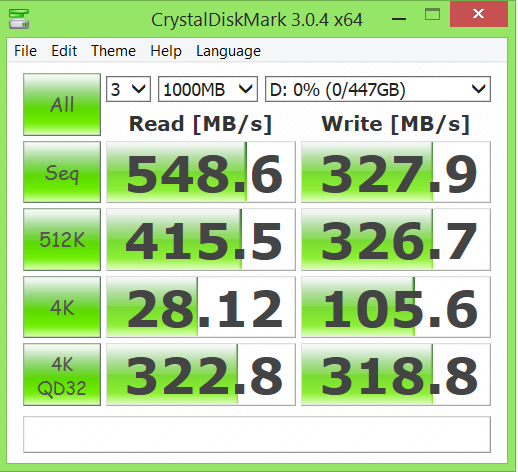CRYSTAL DISK BENCHMARK VER. 4.0.3 X64
Crystal Disk Benchmark is used to measure read and write performance through sampling of random data which is, for the most part, incompressible. Performance is virtually identical, regardless of data sample so we have included only that using random data samples.
As we can see, testing the Ignite M.2 with incompressible data yields similar results. A low 4K write result of 105MB/s is also good to see in this case.
The toughest benchmark available for solid state drives is AS SSD as it relies solely on incompressible data samples when testing performance. For the most part, AS SSD tests can be considered the ‘worst case scenario’ in obtaining data transfer speeds and many enthusiasts like AS SSD for their needs. Transfer speeds are displayed on the left with IOPS results on the right.

 AS SSD gives us our first look at IOPS, yielding a high of just under 99,000 read and 70,000 write IOPS which is relatively in line with listed specs. Similarly, the AS SSD Copy Benchmark provide decent performance in data transfer testing:
AS SSD gives us our first look at IOPS, yielding a high of just under 99,000 read and 70,000 write IOPS which is relatively in line with listed specs. Similarly, the AS SSD Copy Benchmark provide decent performance in data transfer testing:
ANVIL STORAGE UTILITIES PROFESSIONAL
Anvil’s Storage Utilities (ASU) are the most complete test bed available for the solid state drive today. The benchmark displays test results for, not only throughput but also, IOPS and Disk Access Times. Not only does it have a preset SSD benchmark, but also, it has included such things as endurance testing and threaded I/O read, write and mixed tests, all of which are very simple to understand and use in our benchmark testing.
Anvil Storage Utilities demonstrated a bit lower write throughput, along with IOPS, however, it does give us a great view of disk access times at different file sizes.
The SSD Review uses benchmark software called PCMark Vantage x64 HDD Suite to create testing scenarios that might be used in the typical user experience. There are eight tests in all and the tests performed record the speed of data movement in MB/s to which they are then given a numerical score after all of the tests are complete. The simulations are as follows:
- Windows Defender In Use
- Streaming Data from storage in games such as Alan Wake which allows for massive worlds and riveting non-stop action
- Importing digital photos into Windows Photo Gallery
- Starting the Vista Operating System
- Home Video editing with Movie Maker which can be very time consuming
- Media Center which can handle video recording, time shifting and streaming from Windows media center to an extender such as Xbox
- Cataloging a music library
- Starting applications
PCMARK VANTAGE RESULTS
The Patriot Ignite M.2 480GB SSD displayed some great transfer speeds with seven of the 8 technically being speeds we might see in the SATA 3 realm. The top speed observed was that of 470MB/s when testing in Windows media Center.
 The SSD Review The Worlds Dedicated SSD Education and Review Resource |
The SSD Review The Worlds Dedicated SSD Education and Review Resource | 

LES, from what I’ve gathered the M.2 SSD’s overheat a lot, as compared to traditional 2.5 inch or PCIe (slot) drives, & as a result throttle from time to time. Is that more like a norm now or are there exceptions, talking particularly about drives that are close to the SM951 in terms of performance, especially considering there’s very little data on this topic of temperature &/or thermal throttling of M.2 drives from reputable sites like yours?
Can I ask where you are hearing this info on overheating? We have yet to have any drives overheat or throttle in testing. We like to think the 17-24 testing where The drive is filled and TRIM is constrained for several hours might cause such…but it hasn’t. We run several M.2 drives on a continual basis in our systems without any heat considerations at all.
The difference between most PCIe and the notebook drives is they require a mechanism to get the heat to the exterior of the package to dissipate, whereas, the M.2 does not. Imagine running a race car without a hood.
Mostly on forums like AT, TPU, Toms et al. This is just for desktops btw, & most of’em were overclocked setups, so anecdotal or hearsay at best.
I’d like to think in a non open bench system this would be more of a problem, since I don’t own any M.2 SSD myself I’ll just have to rely on word of mouth from fellow board members but there certainly have been complaints of overheating from many of them. As for thermal throttling IIRC only the latest models, like 850 EVO & some of the others, have this mechanism incorporated that actually throttles the drive under severe conditions viz high temperature.
So to sum it up I’m just curious to know whether the extremely SFF & controller are responsible for this overheating/throttling phenomena or are the drives absorbing excess heat from the mobo &/or the CPU, GPU with the results varying greatly, depending on the individuals’ setup also their case airflow?
HELLO , looking for this form SSD with more than 500 GB any words awhere to get those
Many people are – they do not exist (yet). My guess is that first designs are around six month away. Samsung said that they intend to make higher capacities (no details, just vague between the lines suggestion). BTW, Les was asked this a few times, but never commented, thus he also does not know who/when, etc.